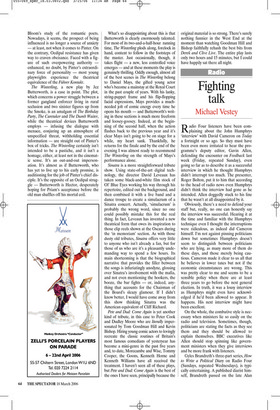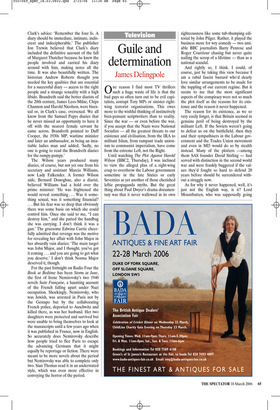Fighting talk
Michael Vestey
Radio Four listeners have been complaining about the John Humphrys ‘interview’ with David Cameron on Today a fortnight or so ago. So they must have been even more irritated to hear the programme’s deputy editor, Gavin Allen, defending the encounter on Feedback last week (Friday, repeated Sunday), even going so far as to describe it as a successful interview in which he thought Humphrys didn’t interrupt too much. The presenter, Roger Bolton, put it to him that according to the head of radio news even Humphrys didn’t think the interview had gone as he intended. Allen doggedly stuck to his line that he wasn’t at all disappointed by it.
Obviously, there’s a need to defend your staff but, really, no one can honestly say the interview was successful. Hearing it at the time and familiar with the Humphrys technique even I thought the interruptions were ridiculous, as indeed did Cameron himself. I’m not against pinning politicians down but sometimes Humphrys doesn’t seem to distinguish between politicians who are lying, as many more of them do these days, and those merely being cautious. Cameron made it clear to us all that he believes in lower taxes but not if the economic circumstances are wrong. This was pretty clear to me and seems to be a sensible policy when there are at least three years to go before the next general election. In truth, it was a lousy interview as Humphrys might even have acknowledged if he’d been allowed to appear. It happens. His next interview might have been excellent.
On the whole, the combative style is necessary when ministers lie so easily on the radio and television. Sometimes, though, politicians are stating the facts as they see them and they should be allowed to explain themselves. BBC executives like Allen should stop spinning like government ministers when they give interviews and be more frank with listeners.
Gyles Brandreth’s three-part series, How to Write a Political Diary on Radio Four (Sundays, repeated Wednesdays), is typically entertaining. A published diarist himself, Brandreth passed on the late Alan Clark’s advice: ‘Remember the four Is. A diary should be immediate, intimate, indiscreet and indecipherable.’ The publisher Ion Trewin believed that Clark’s diary included the definitive account of the fall of Margaret Thatcher because he knew the people involved and carried his diary around with him, making notes all the time. It was also beautifully written. The historian Andrew Roberts thought you needed the key qualities that are essential for a successful diary — access to the right people and a strange sexuality with a high libido. Brandreth said the better diarists of the 20th century, James Lees-Milne, Chips Channon and Harold Nicolson, were bisexual or, in Clark’s case, oversexed. We all know from the Samuel Pepys diaries that he never missed an opportunity to have it off with the nearest female servant he came across. Brandreth pointed to Duff Cooper, the 1930s MP, wartime minister and later an ambassador, as being an insatiable ladies man and added, ‘Sadly, no one is going to read the Brandreth diaries for the rumpy-pumpy.’ The Wilson years produced many diaries, of course, but not yet one from his secretary and assistant Marcia Williams, now Lady Falkender. A former Wilson aide, Bernard Donoghue, also a diarist, believed Williams had a hold over the prime minister: ‘He was frightened she would reveal something ... Was it something sexual, was it something financial? ... But his fear was so deep that obviously there was some basis on which she could control him. Once she said to me, “I can destroy him,” and she patted the handbag she was carrying. I don’t think it was a gun.’ The gruesome Edwina Currie cheerfully admitted that revenge was the motive for revealing her affair with John Major in her absurdly vain diaries: ‘The main target was John Major, and I thought, you’ve got it coming ... and you are going to get what you deserve.’ I don’t think Norma Major deserved it, though.
For the past fortnight on Radio Four the Book at Bedtime has been Storm in June, the first of Irene Nemirovsky’s two 1940 novels Suite FranVaise, a haunting account of the French falling apart under Nazi occupation. Shockingly, Nemirovsky, who was Jewish, was arrested in Paris not by the Gestapo but by the collaborating French police, deported to Auschwitz and killed there, as was her husband. Her two daughters were protected and survived but were unable to bring themselves to look at the manuscripts until a few years ago when it was published in France, now in English. So accurately does Nemirovsky describe how people tried to flee Paris to escape the advancing Germans that it might equally be reportage or fiction. There were meant to be more novels about the period but Nemirovsky was able to complete only two. Sian Thomas read it in an understated style, which was even more effective in conveying the horror of the period.



















































































 Previous page
Previous page